Top 10 Types of floorings: What is the Best Material?
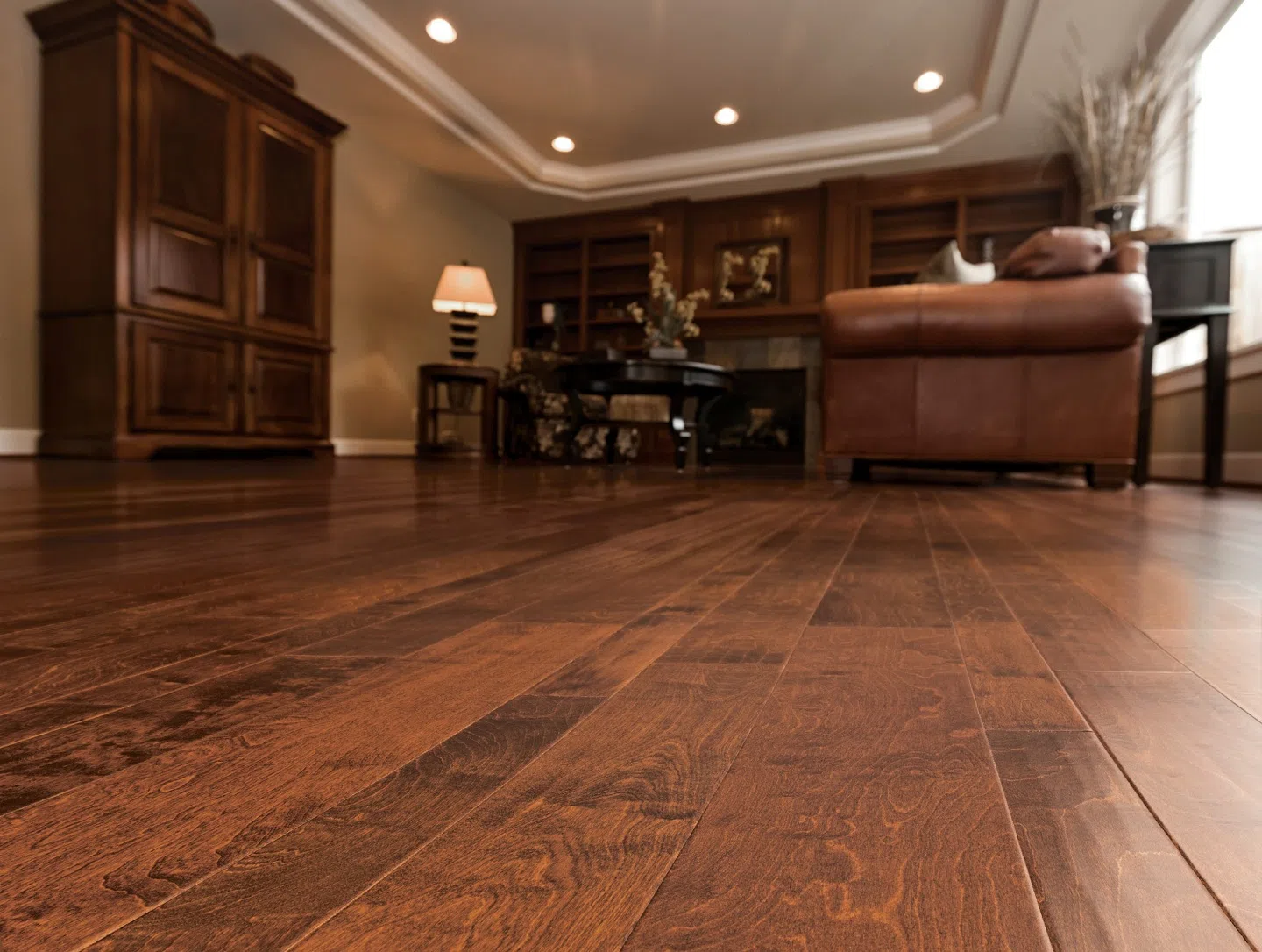
Our floors are an omnipresent yet often neglected aspect of our living spaces. The type of floorings you choose reflects your artistic taste. With countless floor materials available, each displaying distinct merits and potential flaws, it can be challenging to choose the right one. This comprehensive content guide you to choose the best type of flooring materials, spotlighting their pros and cons.
Introducing 10 Types of Flooring Materials
When surfing through the different types of floorings, first, you should consider the purpose of that room. How is it going to be used? How much foot traffic will it attract? Is it prone to moisture? And, after all, does it match your house style and aesthetic? All material types have features that make them suitable for some spaces but inappropriate for others.
Therefore, before deciding on a material, you need to know these factors and all types of flooring materials’ advantages and disadvantages. For instance, hardwood floors are very visually pleasing but not very resistant to scratches, or laminate floorings are very strong, but they don’t have the natural wooden look and grains. After acknowledging all of these pros and cons, you can also use an online free room visualizer app to better choose your flooring material type.
1. Unfading Charm of Hardwood Flooring
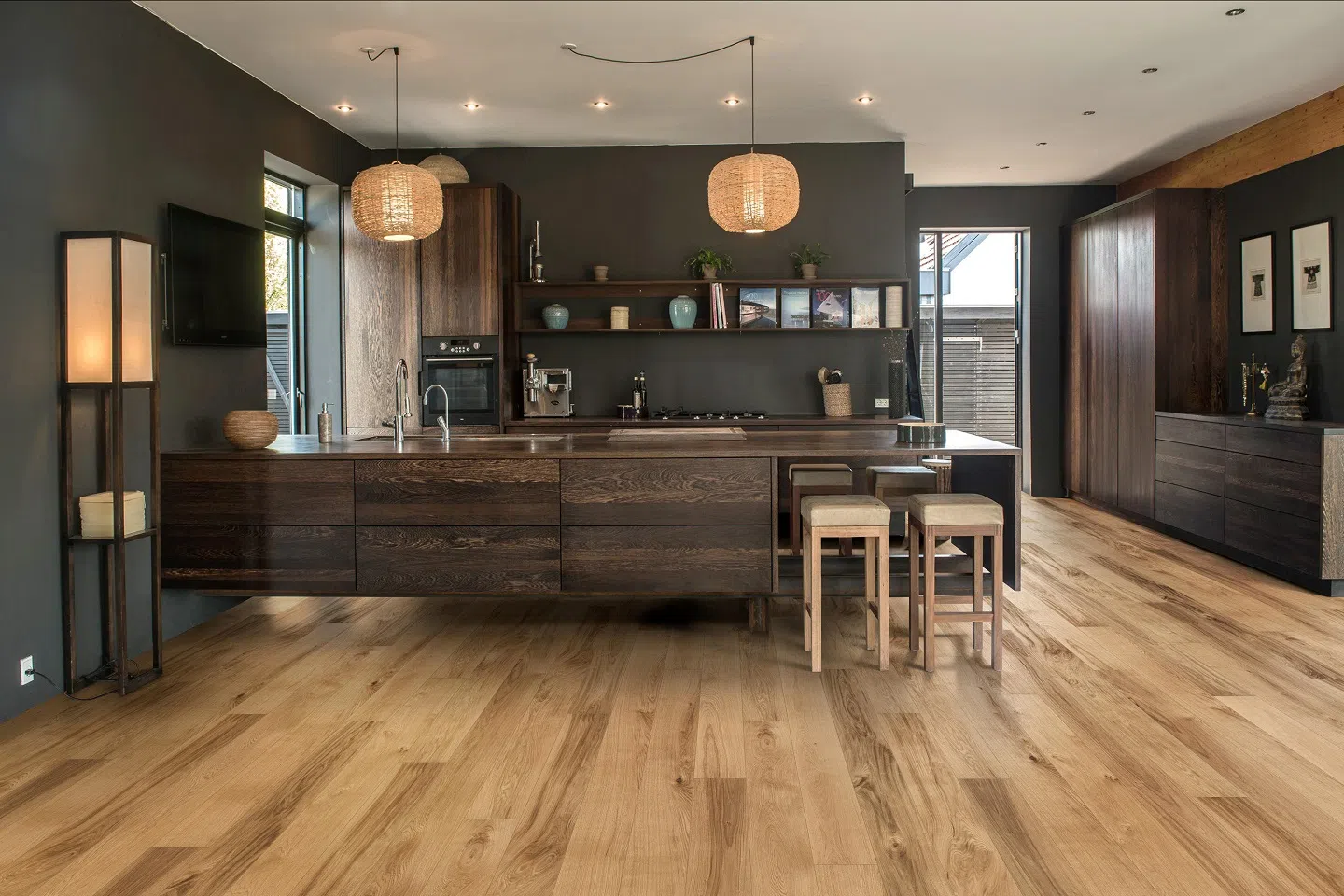
A timeless selection, hardwood defies the ravages of time, radiating a cozy, alluring aura and injecting sophistication into any interior setting.
High-grade hardwood, celebrated for its robustness and longevity, can endure for decades with proper upkeep. Hardwood flooring, as one of the expensive types of floorings, boasts an enduring allure that invariably enhances property value. Furthermore, hardwood floors are easy to clean, which makes them perfect for those with allergies. Because they do not harbor dust or allergens.
Nonetheless, hardwood is not without its flaws. Its prone to scratches, and sustained dampness can induce warping. Also, it is a high-end material commanding a high price, and its placement can be labor-intensive.
Where can you install hardwood?
Hardwood flooring is ideal for most of the rooms in your house like
- bedrooms
- living room
- dining room
- home office flooring
But it is not the best option for bathroom, laundry room and basement since these rooms are prone to dampness and hardwood floor is not resistant to moisture.
Is it just suitable for home, or can I use it in my office?
Hardwood can be used both in residential places like your home and in commercial locations like studios and offices. It has advantages for both settings. If you want to install them in commercial locations, make sure you investigate all the pros and cons since they can not be installed in all types of commercial settings like hospitals.
Pros
- Easy to clean
- Visually pleasing
- Highly durable
- Sustainability
- Versatility
Cons
- More expensive than other materials
- Sensitive to moisture
- Noisy to walk on
Tip: Take a look at the Flooring Outlet and More products showroom.
2. Laminate Flooring: The Most Popular Types of Floorings
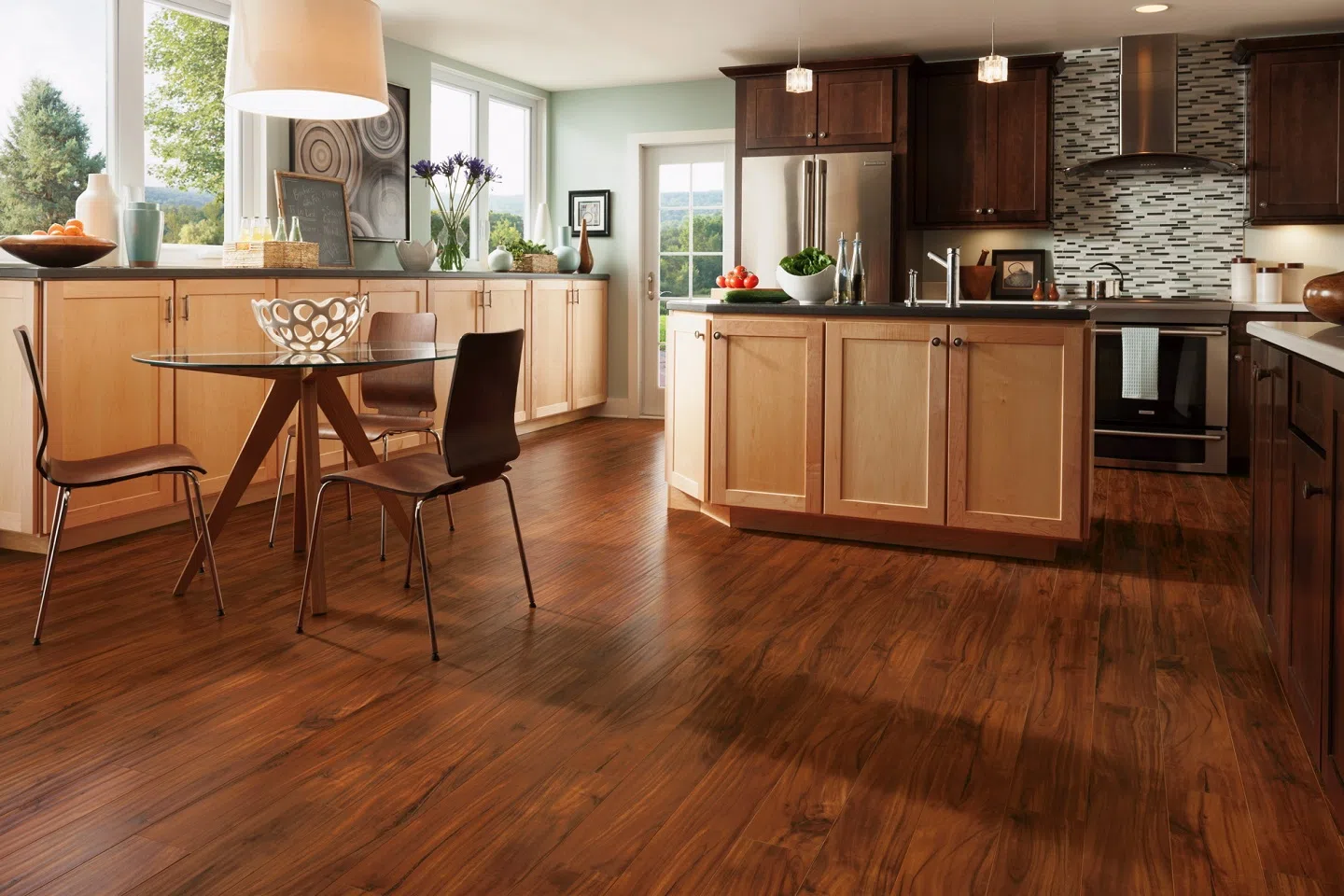
Laminate flooring has become a popular hardwood substitute due to its affordability and versatile design options. Laminate can convincingly reproduce natural materials such as wood, stone, and ceramic without extensive cost. The best type of laminate flooring is straightforward to lay and maintain and highly impervious to staining, scratching, and dampness, making it a great option for areas with heavy footfall.
On the downside, laminate flooring cannot be refinished. Damage necessitates replacement. Its synthetic nature may dissuade those who desire genuine materials, and its impact on resale value is inferior to hardwood.
Where can you install laminate?
Laminate can be a desirable choice for:
- Bedrooms
- Living room
- Hallways
- Dining room
- Moisture-resistant laminates can be installed in bathrooms or laundry rooms
However, even moisture-resistant laminates are not advised to be installed in the basement because it is prone to more dampness and flooding.
Is it just suitable for home, or can I use it in my office?
Laminate flooring is well-suited for both residential locations and office environments. Using laminate in office settings can provide a professional appearance at a lower cost, though you may need additional soundproofing for more specific areas.
Pros
- Cost effective
- Durable
- Moisture resistant
- Easy to install
- Low maintenance
Cons
- Prolonged exposure to moisture can cause swelling and damage.
- Not as luxurious as wood
- Limited refinishing options
- Not as eco-friendly as solid wood
3. The Innovation of Luxury Vinyl Flooring
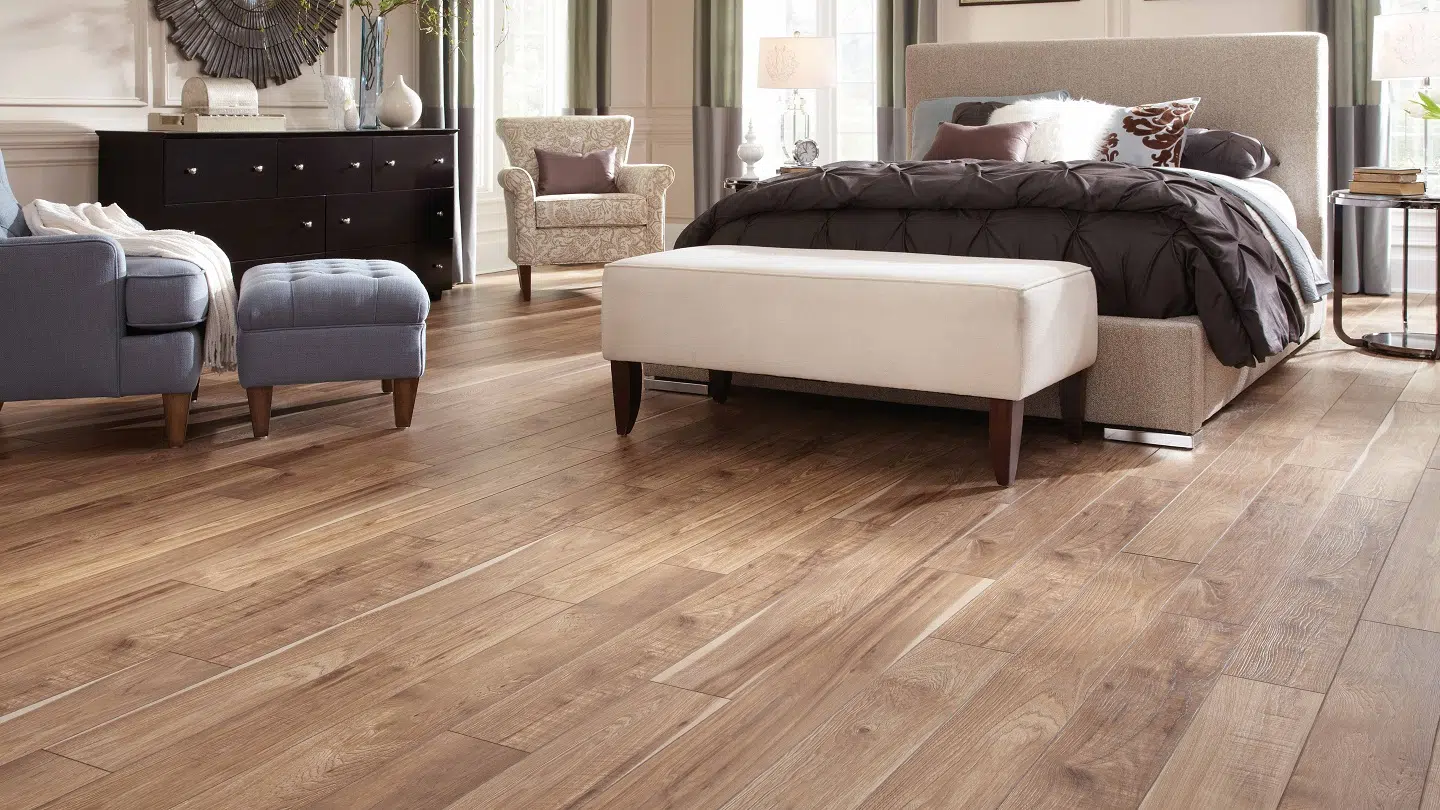
Luxury Vinyl Tile (LVT) or Luxury Vinyl Planks (LVP) are pioneering products merging the finest features of various flooring types. Luxury vinyl is renowned for its extraordinary ability to replicate the appearance of natural materials like hardwood or stone, offering visually attractive flooring. High quality luxury vinyl flooring is water-resistant, ideal for bathrooms or kitchens, and comfortable underfoot.
While luxury vinyl is more durable than traditional vinyl, it can be susceptible to scratches and dents. Though it’s less expensive than the materials it mimics, it’s costlier than standard vinyl flooring. Furthermore, the environmental impact of vinyl production and disposal concerns eco-minded consumers.
The Peel and Stick Vinyl Flooring
Peel and stick vinyl flooring is a DIY-friendly type of flooring for an expedient and affordable update. These flooring tiles or planks come with an adhesive backing that adheres to the subfloor, removing the need for a separate adhesive. They come in various designs and can mimic the appearance of more costly materials. The installation process is straightforward and requires no specialized tools.
However, the durability of peel-and-stick vinyl flooring is generally inferior to other types of flooring materials, and it can be prone to damage from sharp objects or heavy traffic. Also, any irregularities in the subfloor may be apparent through the flooring, requiring a smooth and clean base for installation.
Where can you install luxury vinyl flooring?
- Living Rooms and Bedrooms
- Kitchens
- Bathrooms
- Basements
- Hallways and Entryways
Is it just suitable for home, or can I use it in my office?
Luxury vinyl flooring is proficient for high-traffic areas like office and retail space. Also, it’s stain resistant feature makes it a great choice for healthcare facilities or even gyms and fitness centers along with residential locations.
Pros
- Water resistance
- Durability
- Aesthetic versatility
- Easy maintenance
- Comfort
Cons
- Potential for dents and scratches
- Environmental concerns
- Difficult to repair
4. Tile Flooring
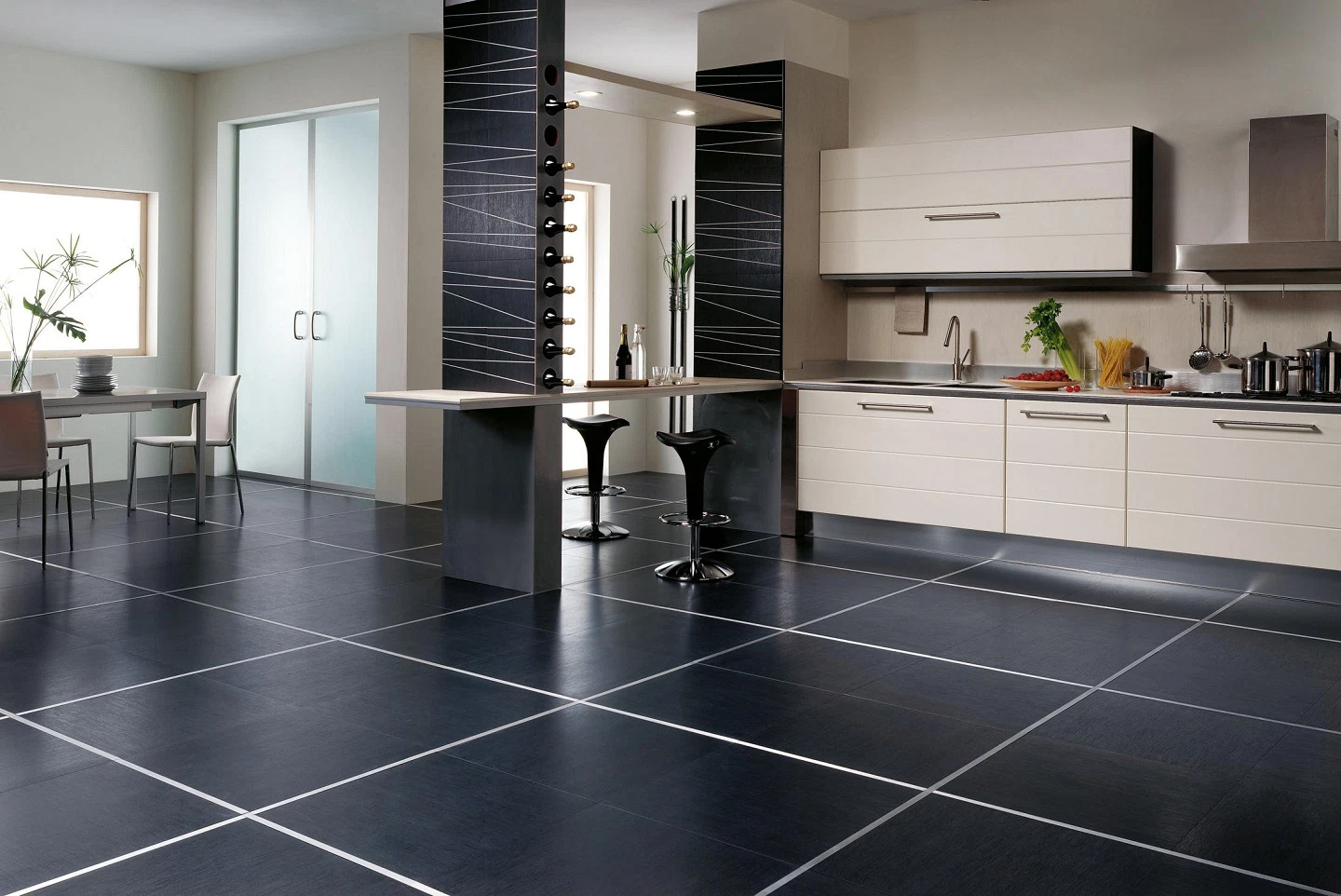
Tile flooring, whether ceramic or stone, offers a robust, low-maintenance solution suitable for various environments, from bathrooms and kitchens to outdoor verandas. Tiles are incredibly resilient to water and wear, easy to clean, and available in an infinite assortment of designs, hues, and textures. They deliver a superior-quality floor material that is sturdy and relatively enduring.
However, tile flooring can be hard and chilly to the touch. It also tends to become slick when wet, and the grout lines pose a cleanliness challenge. The installation process is typically strenuous and requires professional intervention.
Where can you install tile flooring?
- Living Rooms and Bedrooms
- Kitchens
- Bathrooms
- Basements
- Entryways and Mudrooms
- Patios and Terrace
Is it just suitable for home, or can I use it in my office?
It is suitable for all types of settings, from residential to commercial, restaurants and cafes, hotels, and all hospitality settings.
Pros
- Durability
- Water resistance
- Ease of maintenance
- Allergen-friendly
Cons
- Slippery when wet
- Installation complexity
- Cracking and chipping
- Limited comfort
- Difficult to repair
5. The Eco-friendly Option of Bamboo Flooring
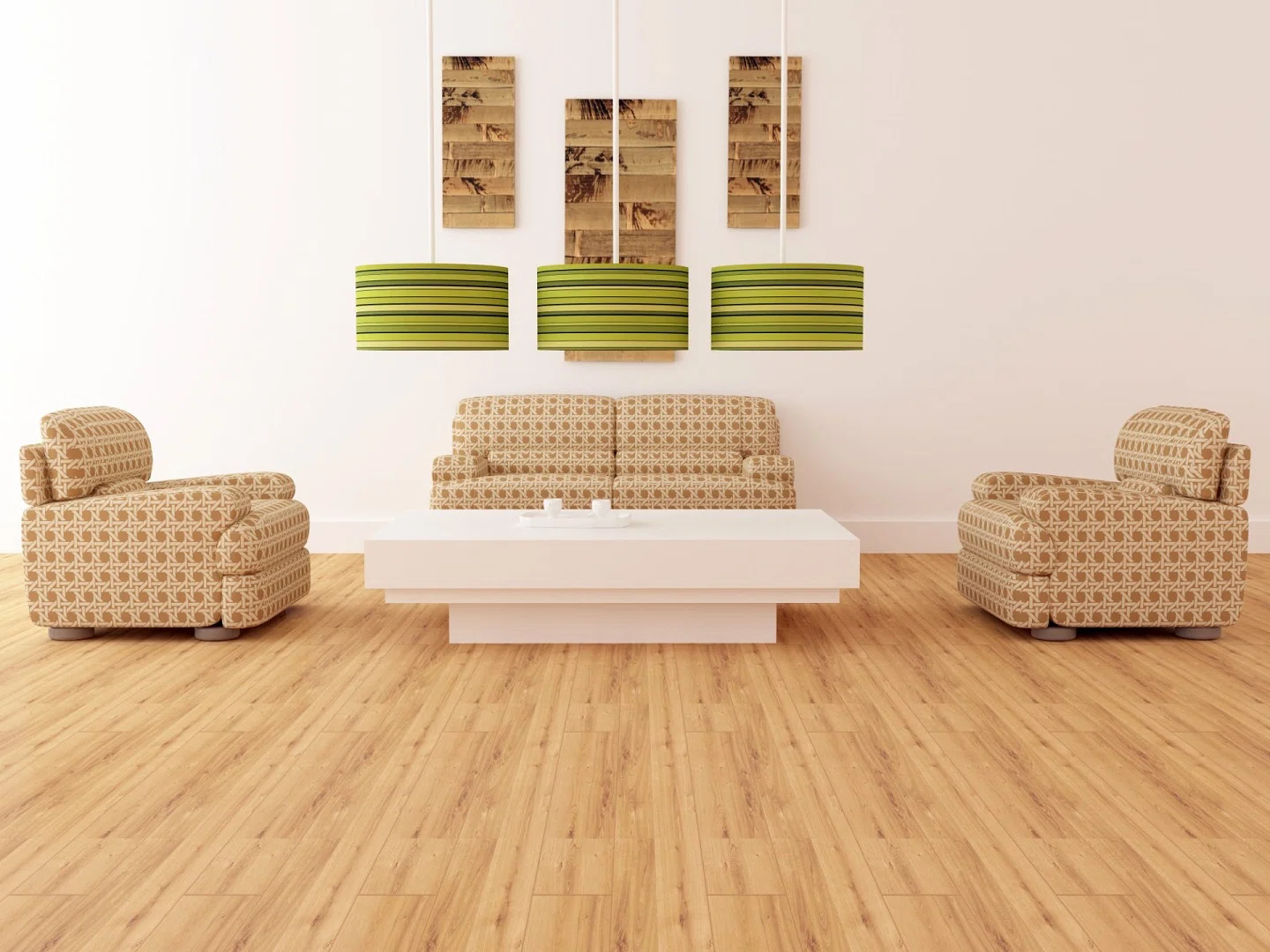
Bamboo flooring, a newer player in the market, is praised for its green credentials and distinctive aesthetics. As a rapidly renewable resource, bamboo merges environmental sustainability with style. It is as robust as hardwood but boasts superior resistance to water and pests. Its natural variations in hue and grain provide an attractive, exotic appearance.
On the negative side, the quality of bamboo flooring can differ significantly due to manufacturing techniques. It may be susceptible to scratches and dents, and its reactivity to humidity shifts necessitates careful examination of the installation environment.
Where can you install bamboo flooring?
- Living Rooms
- Bedrooms
- Dining Rooms
- Hallways
Is it just suitable for home, or can I use it in my office?
Bamboo flooring can add a modern look to commercial or residential settings, and its durability can withstand the demands of a busy workspace or family.
Pros
- Eco-friendly
- Durability
- Aesthetic appeal
- Easy maintenance
Cons
- Susceptibility to scratches and dents
- Moisture sensitivity
- Limited refinishing options
- Limited variety
6. The Warm Embrace of Carpet Flooring
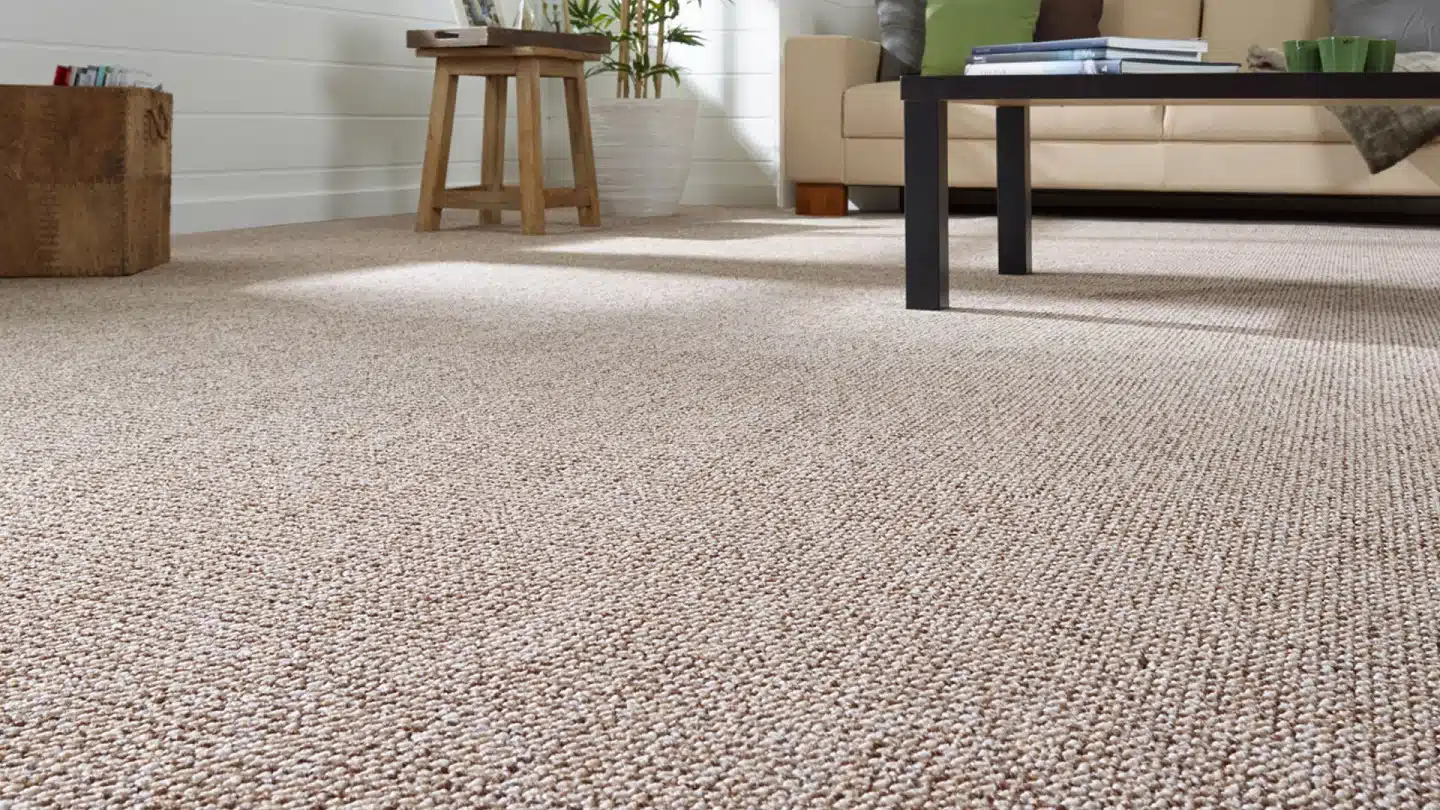
Carpet flooring delivers unmatched comfort and warmth, transforming spaces into snug, welcoming habitats. Carpet comes in various fibers, colors, and designs, offering an extensive array of design options. It also dampens noise and insulates, making it an excellent choice for bedrooms and lounges.
The negatives include high maintenance, as carpets can trap dirt, stains, and allergens, necessitating regular, thorough cleaning. They are also less robust than other flooring options and unsuitable for damp areas. Shaw Carpet is one of the bests in carpet market which is available at Flooring Outlet and More. Do NOT miss it.
Where can you install carpet flooring?
- Living Rooms
- Bedrooms
- Family Rooms
- Hallways and Stairs
Is it just suitable for home, or can I use it in my office?
Carpet flooring is a versatile and comfortable option for many residential and commercial spaces. Its warmth, softness, and noise-reducing qualities make it ideal for living rooms, bedrooms, family rooms, offices, hotels, and more.
Pros
- Comfort
- Warmth
- Noise Reduction
- Safety
Cons
- Stains and spills
- Moisture issues
- Odor retention
7. The Revitalization of Cork Flooring
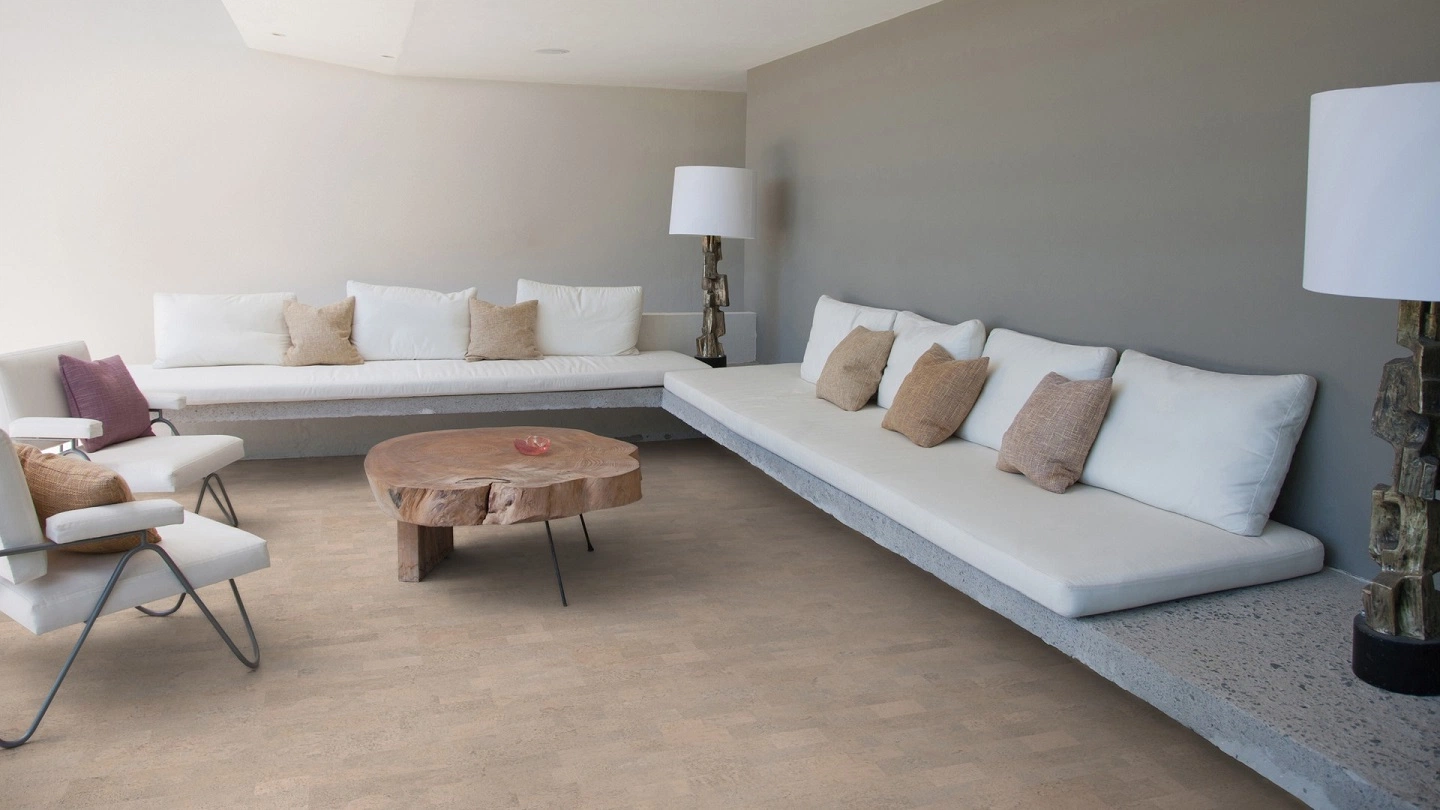
Cork flooring, fabricated from the bark of the cork oak tree, has seen a renewed surge in popularity due to its unique qualities and eco-friendliness. Cork is a naturally renewable material, and its harvesting process does not harm the tree. It offers a soft, cushioned sensation underfoot and excellent insulation properties, both thermal and acoustic. Moreover, cork flooring is resistant to mold, mildew, and pests.
However, cork flooring can be easily marred by heavy furniture or high heels, and its color can diminish when sunlight exposes it. It also requires routine sealing to maintain water resistance, which increases its upkeep requirements.
Where can you install cork flooring?
- Living room
- Bedroom
- Hallways and entrance
- Installing cork flooring in bathrooms or places with moisture is not the best idea and needs proper preparation
Is it just suitable for home, or can I use it in my office?
Cork flooring is suitable for residential settings as well as some commercial offices like yoga studios, or retail stores.
Pros
- Comfortable under foot
- Budget-friendly
- Eco-friendly
- Visually appealing
Cons
- Needs regular care and maintenance
- Not resistant to high moisture
- Might fade or get discoloration
8. The Toughness of Concrete Flooring
Concrete flooring, once reserved for commercial and industrial settings, has made its way into modern residential interior design. Concrete is exceptionally durable and can withstand heavy loads, making it suitable for garages or large furniture. It can be polished, dyed, or stamped to create aesthetic effects. Also, concrete’s thermal attributes make it perfect for underfloor heating.
However, concrete floors can be cold and hard and may require the application of specific coatings or sealants to achieve adequate water resistance. They may also be prone to cracking and discoloration over time, and installing concrete flooring can be an intricate process that requires professional expertise.
Where can you install concrete flooring?
- Basement
- Hallways
- Bathrooms
- Garage
- Patio and outdoor space
Is it just suitable for home, or can I use it in my office?
Concrete is suitable for homes and commercial spaces, workshops, and studios, or even restaurants.
Pros
- Durability
- Maintenance
- Cost-effective
- Moisture resistance
Cons
- Coldness
- Not comfortable
- Installation process
9. The Hybrid Allure of Engineered Wood Flooring

Engineered hardwood flooring is an innovative solution that pairs hardwood’s allure with superior plywood’s stability. Engineered wood is designed to circumvent the problems of expansion and contraction associated with traditional hardwood. It delivers the same luxurious look and feel of wood materials but offers enhanced resistance to changes in humidity and temperature. Additionally, it can be sanded and refinished, extending its lifecycle.
However, engineered wood flooring can only be refinished a limited number of times, depending on the thickness of the top veneer. It also varies in quality, with cheaper versions often containing more inferior layers of wood and a thinner top layer of high-grade wood.
Where can you install engineered wood flooring?
- Living room
- Bedrooms
- Kitchen
- Basement
- Dining room
- Hallways and entrance
Is it just suitable for home, or can I use it in my office?
Engineered wood flooring is one of the best options for house or commercial space flooring due to its durability and ease of maintenance.
Pros
- Eco-friendly
- High durability
- Moisture resistance
- Aesthetic appeal
Cons
- Limited refinishing
- Not budget-friendly
- Prone to damage and scratch
10. The Long-lasting Resilience of Terrazzo Flooring
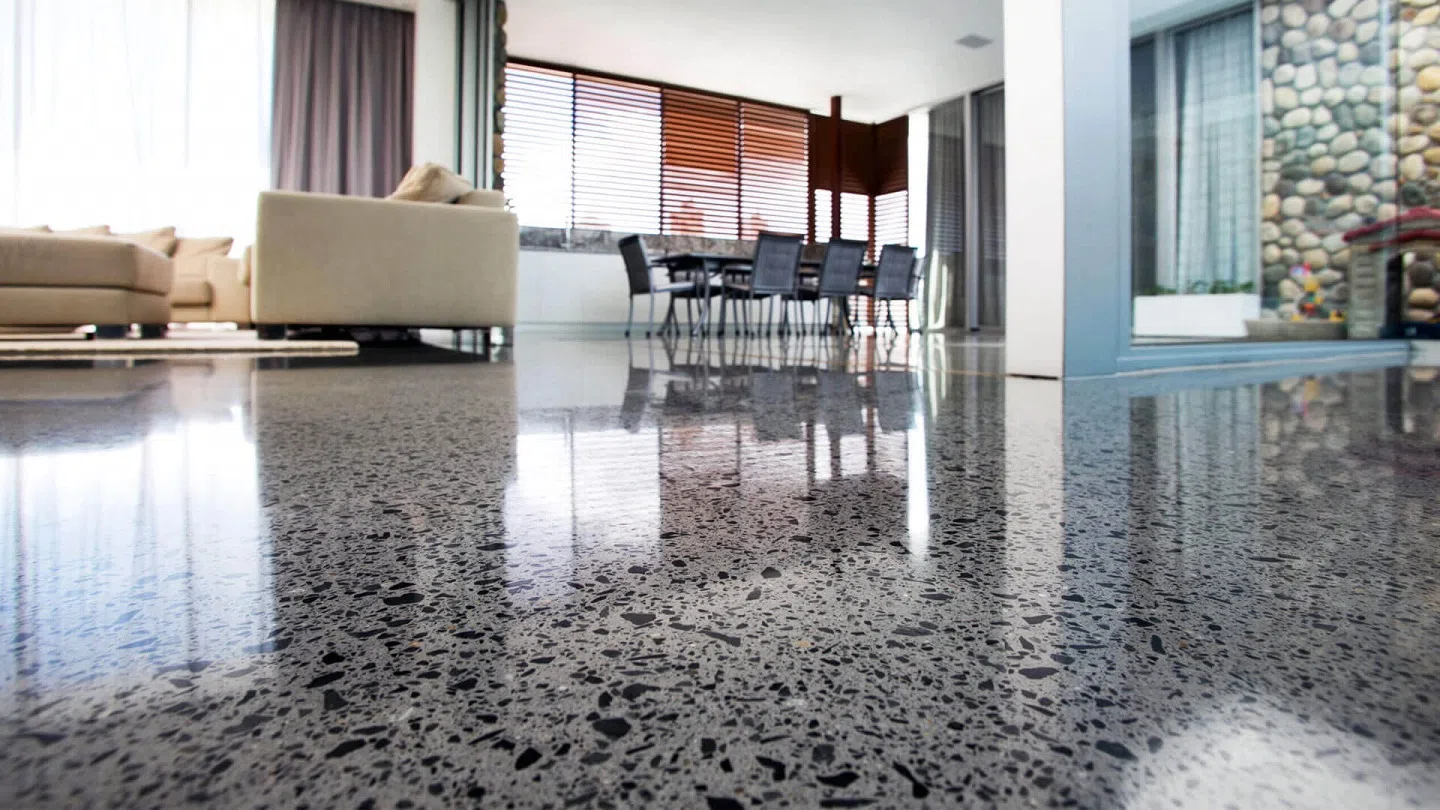
Terrazzo is a composite material, either poured in place or precast, composed of chips of marble, quartz, granite, glass, or other suitable material embedded in a cementitious, polymeric, or resinous binder.
Terrazzo is extremely durable and long-lasting, with some installations in place for over a century. It offers limitless design possibilities as the chips can be of various colors and shapes. Terrazzo flooring is easy to maintain, and its non-porous surface makes it resistant to water and stains. However, terrazzo flooring can be pricey and requires professional installation; its hard and cold surface might not provide comfort underfoot, and it can be slippery when wet.
Where can you install Terrazzo flooring?
- Living room
- Bedroom
- Kitchens
- Hallways and staircases
- Basements
- Outdoor flooring
Is it just suitable for home, or can I use it in my office?
You can install Terrazzo flooring for commercial spaces like hotels, restaurants, or office buildings or even public spaces like airports, schools, and hospitals, as well as residential locations.
Pros
- Eco-friendly
- Aesthetic appeal
- Moisture resistance
- Low maintenance
Cons
- Cold and hard under foot
- High initial cost
- Heavy weight
- Slippery when wet
A Synopsis of the Best Types of Floorings
The optimal flooring material heavily relies on the specific demands of space and the lifestyle of its inhabitants. Quality, resilience, maintenance, cost, and visual appeal are all key considerations when you want to buy aby types of flooring materials. The options discussed in this essay, from solid hardwood flooring and laminate to tile, bamboo, and carpet, offer unique advantages and disadvantages. One can make an educated choice by comprehending these, establishing a solid foundation that harmonizes functionality and style.
Choosing the right type of floor material depends on various factors, including;
- personal taste,
- budget,
- and the space’s specific needs.
Hardwood flooring offers timeless elegance and durability, while laminate flooring delivers versatility and affordability. Tile flooring is an excellent option for high-moisture areas, while bamboo flooring is eco-friendly and stylish. Carpet flooring provides unmatched comfort but requires high maintenance and cork flooring offers unique cushioning and insulation but needs regular upkeep.
Finally, concrete flooring is remarkably durable and customizable but may require specific coatings or sealants for adequate water resistance. Ultimately, the ideal types of flooring material perfectly balances functionality, durability, and aesthetic appeal.


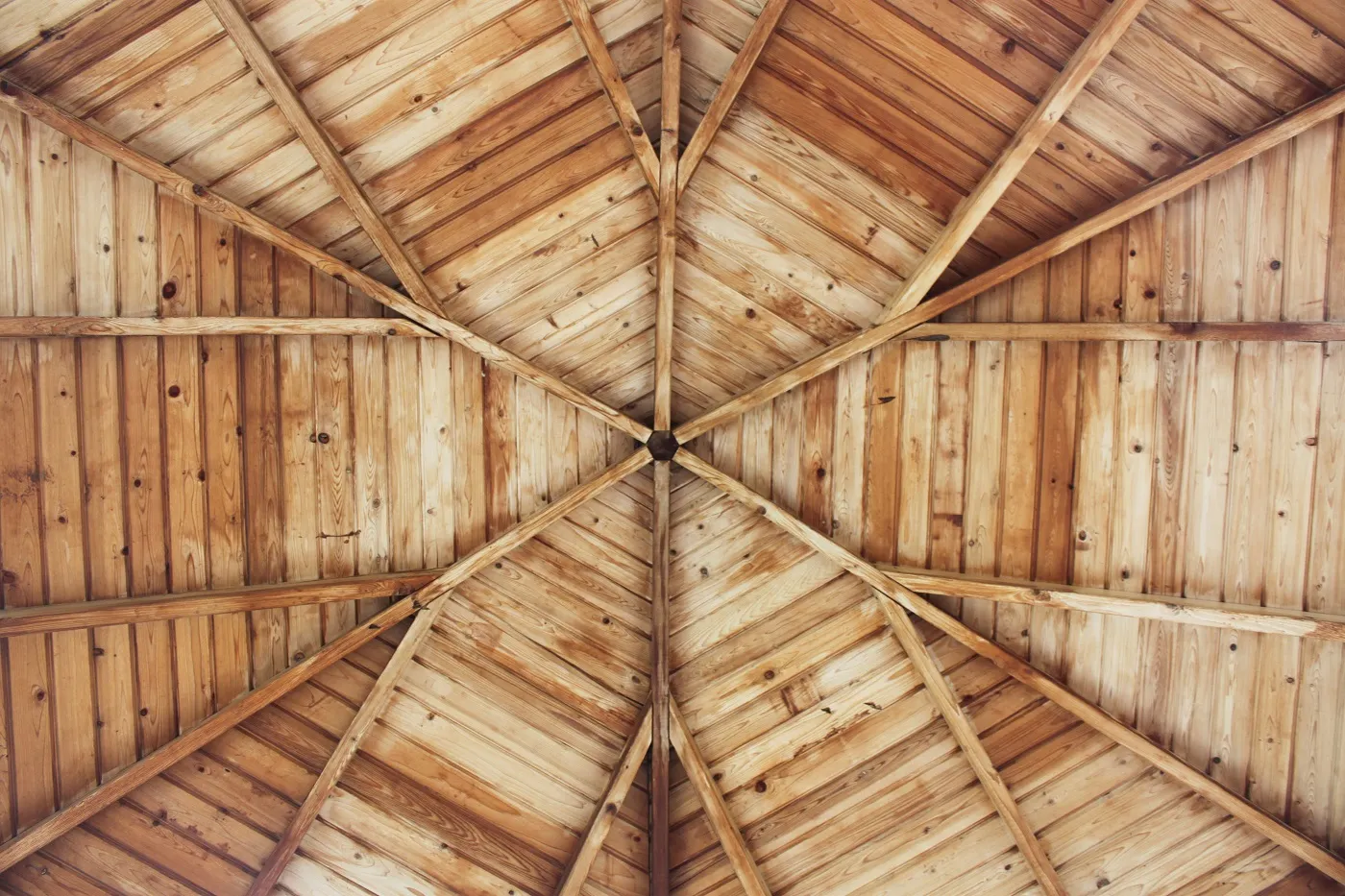
Did you find what you were looking for?